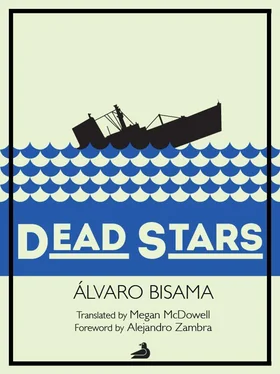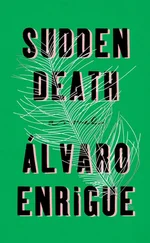The same thing happened in two or three other places. They got kicked out for those kinds of problems. Javiera would meet up sometimes with an anarchist group. She got pregnant again in November of that year. They ended up moving into a hotel close to the Congress building, she said.
I put my studies on hold, skipped that semester. I had an accident and I had to kick the syrup. I fell into an empty pool at a party. At the party, there was a Pixies song playing. That's when I fell in. Backwards. I don't remember being in the air. The syrup protected me. Everything went black almost immediately. When I regained consciousness, the song was still playing. It was saying: This monkey's gone to heaven. I hadn't gone anywhere. Someone was shouting in my ear. I broke a leg and an arm. They had to operate; they reconstructed my elbow. My parents got cable TV for me in my room. I could feel my withdrawal, but I swallowed it in silence. The details are unpleasant and I'd rather not remember them. Aches. Cold sweats. Vomiting. Insects pushing their way between my skin and my muscles. Voices from a planet inside my head. My stomach shrunk and my skin cracked open. I didn't shave for a good while. I let my hair grow into dreadlocks. It didn't seem to matter to anyone. I started a diary but I only scribbled numbers and doodles in it. I watched music videos all day. I got addicted to painkillers. I lost entire days. I didn't read anything. I got even thinner, she said. I barely spoke to my parents. Almost no one came to see me. I didn't leave the house for two months, except to take a taxi to the clinic. I watered the plants and waited for the apocalypse. From there, Viña seemed unreal to me. Valparaíso didn't exist, she said. It was a formless black stain, an unknown city. The pain had let up by then. Not having syrup made me feel weak, as if my body was only half of what it once was. As if I didn't have any organs and there was nothing under my skin except broken bones, she said. Nothing under my skin but emptiness. I regained my depth perception. I met a guy at the clinic. A forty-year-old man, a bank employee. I've told you a little about him. Separated from his wife. A fucking wreck. I also told you we slept together for a couple weeks. I never came. I told you that too. He would come to see me at my house when my parents left for work. He was on medical leave for depression. He also suffered from seizures and panic attacks. He asked me to be his girlfriend. He told me I was the only real thing in his life. I ended it with him right then. I told him nothing in my life seemed real. First came my slowly ebbing pain, sending deaf signals from my broken leg and my reconstructed elbow, and then came everything else, what you could call life. They still hadn't taken my cast off; we'd slept together those two weeks during working hours with the cast on my arm. He never called again after that, she said. He told me he was going to kill himself. I didn't believe him. I wanted to believe him. I walked around with the appealingly morbid idea that he had committed suicide. I fantasized that someone could kill himself because of me. When they took the cast off my leg, I shaved my head. I threw the dreadlocks out. I thought I could shed my skin that way. I saw a movie about a woman who called a suicide hotline and fell in love with the guy who answered. The woman didn't know why she was calling; she'd never thought about suicide. Being alone was all she knew; she wandered through empty streets. The guy who answered the phone was nice, charming. When she called on the phone she said: I'm going to kill myself. I want to die. And then she started telling the guy everything that had happened to her that day. The most horrific things became commonplace. Everything commonplace became horrific. I don't remember how the movie ended, she said. I never remember how anything ends. What I do remember is that city full of dirty light, the colors of the telephones, black or beige. But I don't remember how it ended, she said. I thought about that movie when I went back to the university the next semester, after summer ended. The port was still a dark city. Neither Javiera nor Donoso went back to classes.
I never fully recovered. Now that I think about it, I've been sick ever since, she said. I never got back up from the bottom of that empty pool, with my arm destroyed and the taste of syrup in my mouth, blacked out to avoid the pain. Now that I think of it, I've never come back from that cold.
The last time I saw them was in that hotel. Until now. Until this newspaper. I don't know how to tell you this, man. I don't know how to tell you this because from this point on, everything becomes hard to trace, like blood or shit smeared on the floor, she said. I'll summarize. I'll go back over it: I had gotten off the syrup and shaved my head. They had moved in to that hotel. Javiera had gotten pregnant again. These are the last certain facts. The last real ones. After that, another life began. After that, my life began. After that, you appeared.
Just like the city, like the whole country frozen in time, that hotel was in ruins.
I said: I knew that hotel. I never went inside. I saw it from the street. It was in one of those parts of the city that urban renewal never reached, close to the Congress and the market. I always thought that particular block was especially sad. Next to the hotel there was a bar where they used to play death metal. I went there sometimes, I said. I always noticed the hotel's façade, which had once been white but was now cracked and crumbling and covered in graffiti. I had long hair and wore black t-shirts. I remember how the reception area looked from the street, like a photo taken from a moving car. Memory as a crooked picture frame. The photo empty, deserted. There was never anyone there. The market was two blocks away. No one seemed to even realize that place existed. I always wondered what they charged, how much a night there cost, or who would possibly live there.
Javiera and Donoso did. They moved in there. It couldn't have been very expensive, she said. I mean, if they moved there, it couldn't have cost a peso. Because nobody else would have them. Lila, that girl from the Party I told you about before, said: Once you leave here, you can't come back. Every move is a betrayal. You get judged. Javiera fucked up. She didn't follow through with the commitments she made. That fucker Donoso tore her up. Lila told me: We were jealous of her. She survived a lot of shit. She gave herself to the Party the same way she gave herself to that asshole. I've never seen anyone so all-in. She was infatuated with him and then everything just went to hell. I don't know what happened. The fucker did what he did to her and still she went back to him. She forgave him. She threw everything away. Her son, her husband. She hurt herself, she hurt everyone else. You should have seen her, man, how she started acting at the meetings. She shouted in our faces. She told us all to go to hell. She would go into hysterics. The anarchist kids and the Trotskyites were happy to have her, Lila told me. Javiera lost it, she said. You didn't see her then, before she got pregnant. She called us all fascists, sellouts. ¡Patria o muerte! she'd shout, Fatherland or death! She hung out with the anarchists, practically homeless street punks who drank rum at all hours of the day. She would disappear with them. You didn't see any of that, Lila told me. You didn't see how low she sank. You didn't see those things anymore. You didn't want to see anything. You weren't around. You didn't see how violent she got. Then she got pregnant again and she vanished and we were all relieved.
Читать дальше





![Джеймс Чейз - Safer Dead [= Dead Ringer]](/books/430347/dzhejms-chejz-safer-dead-dead-ringer-thumb.webp)






